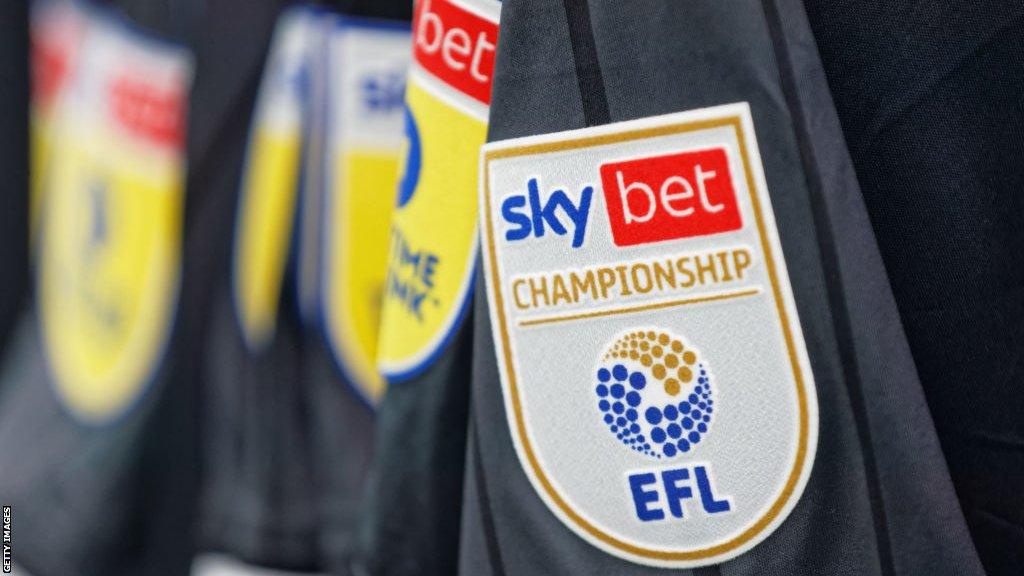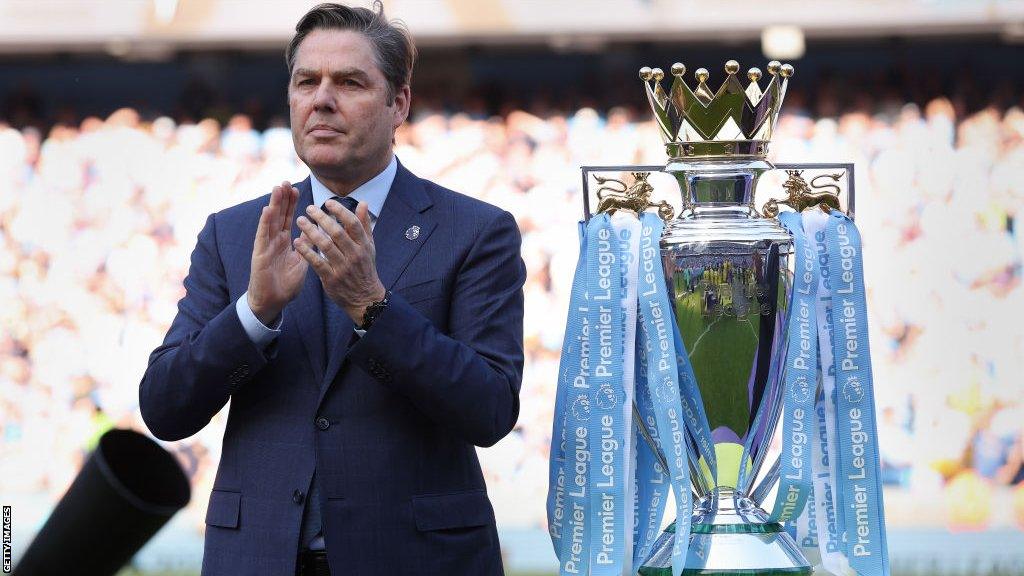Premier League: Fallout from failure to agree funding deal with EFL could last for years
- Published
- comments

The backlash from this week's collapse of a Premier League funding deal that would have seen more money given to the English Football League has become one of English football's most divisive disputes.
One that has raised questions about the way the game is run, the Premier League's relationship with the UK government, and the future of its leadership.
So what lies behind this stalemate, what's at stake, and what happens next?
Background
As recently as January, Premier League chief executive Richard Masters told a parliamentary committee he had been assured that "the vast majority of clubs want to do a deal, provided it's right for both parties".
And yet on Monday, despite many months of "positive" talks, it emerged that his clubs were still so split on the estimated £900m over six-years proposal, a vote did not even take place. Instead, the league said it would now prioritise the adoption of new spending rules. So what went wrong?
Five years have now passed since the collapse of Bury, who were expelled from the EFL after going bust amid financial mismanagement. Arguments over whether the Premier League should share more of its wealth had been raging for decades. But for many, the shocking demise of the League One club was a stark symbol of vast inequality in the game, a dangerous dependence on owner funding, and a lack of financial sustainability.
That, along with various crises at other EFL clubs such as Macclesfield, Derby and Wigan, the impact of the pandemic, and the fallout from the European Super League (ESL) controversy, all contributed to the findings of the 'fan led review' in 2021.
It recommended the creation of an independent football regulator with the power to impose a financial settlement on football, if the Premier League failed to agree a more generous funding package with the EFL.
With the government supporting the review's findings, the Premier League has been under mounting pressure ever since to reach agreement on a so-called 'New Deal' for the EFL.
Last year, the government said the current distribution of money by the top-flight was "not sufficient", and pointed to a £4bn gap between the turnover of Premier League clubs and Championship clubs.
Why 'No deal?'
Some Premier League clubs were said to be supportive of the proposal in principle.
But despite signing a record £6.7bn domestic TV deal in December, others questioned why they should give significantly more money to potential rivals in the EFL when such teams often have very wealthy owners of their own, and may not be run responsibly.
Especially at a time when most Premier League clubs lose money each year. Some will have pointed to the £1.6bn the league is currently sharing with the football pyramid over a current three-year period. It has also been suggested that the pressure from government was unhelpful when it came to negotiations that have always previously been conducted in private.
The Premier League had struggled to overcome an impasse with the EFL over lucrative 'parachute payments' to relegated clubs. The EFL wants them abolished over fears they distort competition and increase the risk of reckless spending by clubs desperate to reach the top flight.
The Premier League disagreed and said they were essential for clubs to have the confidence to invest, and provide the competition that ultimately generates the value that is shared with the lower leagues.
There have been suggestions that when a Premier League 'proposal' was put to the EFL in September, 15 issues were highlighted that still needed resolving, and that therefore, the failure to reach agreement was no real surprise.
Masters alluded to this in January when admitting his clubs "do not have "a unified position".
A fractured league?
There is also a sense that achieving agreement among the Premier League clubs has become harder than ever. Masters touched on this in parliament a few weeks ago, admitting that it was "very difficult to corral clubs into common positions on issues like this."
The secret talks between the 'big six' clubs that led to the ESL breakaway in 2021 exposed the lack of control that league chiefs had over their members. As did the failure of the league to secure the necessary support for a ban on player loans between clubs which shared owners in December.
The threat last month of legal action from an un-named club over amended rules around commercial deals was yet more evidence of fractured relationships.
The controversy swirling around the financial rule charges brought against Everton, Nottingham Forest and Manchester City have added to the tensions within the league, and made Masters' job of achieving consensus even harder.
And given the points deduction that Everton have already suffered, is it any surprise that some clubs want more certainty over what exactly will replace the Profit and Sustainability Rules (PSR) that the club fell foul of, before signing up to a new funding deal? Especially when it is clear that several of them are struggling to adhere to the current regulations.
Where does this leave Richard Masters?

The Premier League boss told MPs in January that securing a funding deal was his "number one priority".
But this week the league was accused of "parking the bus" by DCMS Committee chair Caroline Dinenage.
Given such criticism, the collapse of the deal, and the fact that it is Masters who ultimately has to sit in front of such MPs and explain himself to them and to the government, some may wonder if he has concluded his role has become akin to 'herding cats'.
Especially given the intense criticism sparked by the league's handling of the financial rule cases involving Everton and Manchester City. Last month he had to clarify remarks he made to the DCMS committee, insisting he "did not intend" to suggest Everton and Nottingham Forest were "small clubs".
But those close to Masters point to his resilience in steering the league through the pandemic, and the ESL fiasco, and insist he is now fully focused on securing adoption of the new spending rules - which will be based on a system already used by Uefa that will allow spending on wages and transfers linked to a proportion of a club's revenue.
The backlash
The news that top-flight clubs had walked away from the proposed deal sparked a major backlash among lower league clubs, some of whom pointed out the roles they play in discovering and developing young footballing and managerial talent, along with their importance to fans and their local communities. "An absolute disgrace", was how Salford City co-owner Gary Neville put it, accusing the Premier League of being "negligent in their dismissive nature, just pushing it down the road".
The EFL expressed its disappointment at what it called the Premier League's "repeated failure to put forward any new funding offer for EFL clubs that would have significant benefits for the entire football pyramid".
Ministers meanwhile, were said to be "exasperated" according to a well-placed source. In the House of Commons, Labour's Lucy Powell MP challenged the government to introduce the Football Governance Bill that would finally establish the independent regulator. "If they don't want to regulate football governance then we will," she warned.
"The game clearly has not managed itself very well," former FA and Manchester City chairman David Bernstein told BBC Sport. "It's still governed by conflicts of interest. We have to have a regulator with proper powers and authority. And I'm a little concerned that the Bill that is meant to be coming out, although it's been delayed and delayed, will not be strong enough."
Kevin Miles, chief executive of the Football Supporters' Association, told BBC Sport: "Football has had years to get its act together and find a financial settlement - time and again it has failed to do that.
"The government has repeatedly promised an independent regulator and it has to deliver and deliver now. We are deep into time added on."
The government says legislation for the regulator will be introduced into parliament "shortly". But with a date for tabling the bill yet to be confirmed, time in this parliamentary session running out, and a general election on the horizon, some wonder whether it could still be months before the regulator is up and running.
And with suggestions that some Premier League clubs are prepared to take legal action if told by the regulator that they have to pay more money to the EFL, there are fears this dispute could rumble on for years.

Our coverage of your Premier League club is bigger and better than ever before - follow your team and sign up for notifications in the BBC Sport app to make sure you never miss a moment
